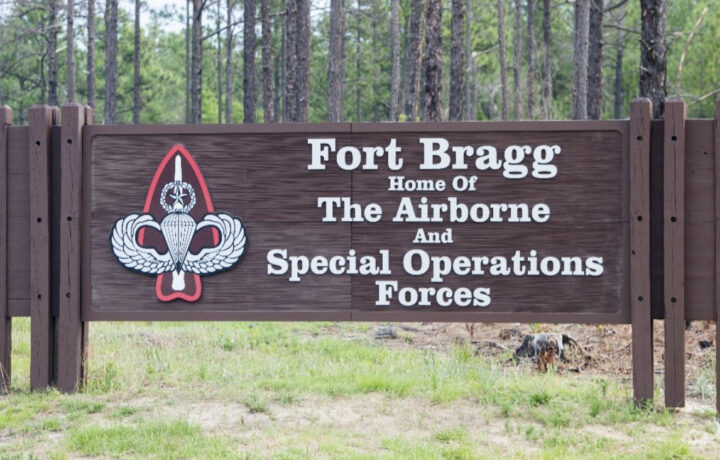Established on September 4, 1918, as “Camp Bragg” outside of Fayetteville, NC, today’s Fort Bragg is now one of the largest military installations in the world with around 54,000 military personnel. It was named for native North Carolinian Confederate General Braxton Bragg, who had previously served in the United States Army during the Mexican-American War.
Fort Bragg is now one of the 10 United States Army installations named for officers who fought for the Confederacy during the American Civil War. Along with Fort Benning, Fort Gordon, and Fort Lee – among others – Fort Bragg will see its name changed as a result of the National Defense Authorization Act (NDAA) for Fiscal Year 2021 included a provision that all of those bases to be renamed. The Naming Commission, which was created by the United States Congress, had proposed a number of possible names.
The recommendations came after months of site visits, meetings with local leadership, and even consideration on how the new names would be historically relevant and inclusive.
Fort Benning would be renamed to honor Lt. Gen. Hal Moore and his wife Julia, while Fort Gordon would be renamed Fort Eisenhower. Other installations could be similarly renamed to honor notable U.S. military figures including Medal of Honor recipients. This includes Fort A.P. Hill, which will be changed to Fort Walker, after Dr. Mary Walker, the Army’s first female surgeon. Fort Lee, VA will be renamed Fort Gregg-Adams, after Lt. Gen. Arthur Gregg, a key figure in the integration of black soldiers, and Lt. Col. Charity Adams, one of the highest-ranking female soldiers to serve during the Second World War.
However, the renaming of the North Carolina installation has been more controversial as it will likely be renamed Fort Liberty – the only installation that will not be named after a specific person or persons.
Why Liberty?
There has been some confusion over the decision to opt for “Fort Liberty” as the name – but there has been speculation that it likely comes down to the fact that the installation is home to both the United States Special Operations Command and the 82nd Airborne Division, and each would seek to want to name it for a veteran from one of those units.
As an agreement couldn’t be reached, Fort Liberty was put forward.
One option suggested by some on social media was to rename the base in honor of Medal of Honor recipient Master Sgt. Roy Benavidez as he had served in both the Special Forces and the 82nd Airborne Division.
However, The Naming Commission’s report to Congress noted that “Fort Liberty symbolizes the U.S. Army’s defense of liberty,” while it further stated that the word “Liberty” is featured in the 82nd Airborne Division’s song and is part of the Army Special Forces’ motto.
There has been significant criticism on social media over the choice of name with some suggesting that there are still plenty of American heroes who could be honored. Yet, for now, it looks like Fort Bragg will become Fort Liberty, which in accordance with the NDAA has to be completed by early next year.
Change Doesn’t Come Cheap
Renaming the 10 Army bases will reportedly cost around $21 million, The Naming Commission also reported. The process will require removing the old names from all base paraphernalia, from street signs to recycling bin decals to business cards. On the low end, it will still cost around $300,000 to rename the Virginia Army National training site from Fort Pickett to Fort Barfoot.
The most expensive base to be renamed is not surprisingly Fort Bragg, as it is the largest. It will cost the Department of Defense (DoD) an estimated $6.37 million.
More Renaming Coming
Many of the bases that had been named to honor Confederate officers were often “hastily” chosen, and bases built in the South had deferred to “local sensitivities” or “regional connections” to the namesake. Likewise, some past military vehicles – such as the World War II-era M3 Stuart and M3 Lee tanks for example – as well as some warships were named to honor Confederate leaders for similar reasons.
The Naming Commission had also recommended that any decommissioned or deactivated ships honoring Confederate leaders should be renamed should they be returned to service. Likewise, the report has called for buildings, streets, or other items at West Point and the Naval Academy to be similarly renamed.




